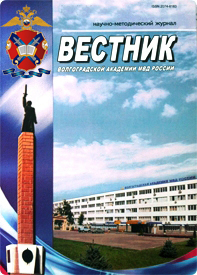The article is devoted to the study of the world outlooks of the concept of human rights. Based on the analysis of various conceptual approaches to the concept of man and his essence in different civilizations, the features of their political and legal organization and the nature of the relationship between state power and the individual are revealed. Established on the basis of the Protestant doctrine of predestination and humanistic attitudes of the Renaissance, the ideology of liberalism is established, in which the individual is the last and highest reality, representing a sovereign, complete system, and human rights as a means of its existence, providing its needs and interests solely as a subject material, natural world. Therefore, these rights are called natural, ie, derived from the biological nature of man. On this basis, man begins to be viewed not as a mix of spiritual and animal principles, but as a highly organized animal. As a result, the principle of «struggle for survival» and a more comfortable existence is laid in the basis of relationships between people, and the sphere of individual freedom of man becomes basically the domain of his material, biological existence. Accordingly, the state and state power, the law and the constitution, an independent court, etc. exist only in order to protect some people from the evil nature of others. Thus, the problem of human rights becomes a space for politico-legal manipulation, as a rule, very destructive. To avoid this, it is necessary to give the concept of human rights a civilizational spiritual and religious and socio-political dimension that presupposes a qualitative update of legal anthropology in which the concept of human rights as its component would not destroy the state and society as it has been in recent decades, and helped their consolidation.
human, human rights, freedom, civilization, state, power, society, religion, liberalism, individual, sovereignty
1. Aristotel'. Politika // Sochineniya: v 4 t. M.: Mysl', 1984. T. 4. S. 375-644.
2. Dugin A. G. Metafizika Blagoy Vesti // Absolyutnaya Rodina. Puti Absolyuta. Metafizika Blagoy Vesti. Misterii Evrazii. M.: Arktogeya-centr, 1999. S. 205-570.
3. Polosin V. S. Mif. Religiya. Gosudarstvo. M.: Ladomir, 1999. 440 s.
4. Viko D. Osnovanie Novoy nauki ob obschey prirode naciy. M.-Kiev: RE ZJ - vostok - ZhA, 1994. 656 s.
5. Vysokopreosvyaschenneyshiy Ioann, mitropolit S.-Peterburgskiy i Ladozhskiy. Samoderzhavie duha. Ocherki russkogo samosoznaniya. SPb.: Izd-vo L. S. Yakovlevoy. 1994. 259 s.
6. Alekseev N. N. Hristianstvo i ideya monarhii // Russkiy narod i gosudarstvo. M.: Agraf, 1998. S. 48-67.
7. Men' A. V. Istoriya religii: v poiskah Puti, Istiny i Zhizni: v 7 t. T. I. Istoki religii. M.: Slovo, 1991. 287 s.
8. Klyuchevskiy V. O. Istoriya sosloviy v Rossii // Sochineniya: v 9 t. T. VI. Special'nye kursy. M.: Mysl', 1989. S. 225-391.
9. Karpec V. I. Rus' Merovingov i koren' Ryurika. M.: Algoritm, Eksmo, 2006. 512 s.
10. Alekseev, N. N. Obyazannost' i pravo // Russkiy narod i gosudarstvo. M.: Agraf, 1998. S. 155-168.
11. Razvitie russkogo prava v XV - pervoy polovine XVII v. / otv. red. V. S. Nersesyanc. M.: Nauka, 1986. 288 s.
12. Dugin A. G. Teoriya evraziyskogo gosudarstva // Russkiy narod i gosudarstvo. M.: Agraf, 2000. S. 5-20.
13. Kal'vin Zh. Nastavlenie v hristianskoy ve-re // Antologiya mirovoy pravovoy mysli. V 5 t. T. II. Evropa V-XVII vv. M.: Mysl', 1999. S. 673-679.
14. Istoriya politicheskih i pravovyh ucheniy: Srednie veka i Vozrozhdenie. M.: Nauka, 1986. 353 s.
15. Chicherin B. N. Istoriya politicheskih ucheniy. T. I. SPb.: Izd-vo RHGF, 2006. 720 s.
16. Filosofskiy enciklopedicheskiy slovar' / red. kol. S. S. Averincev [i dr.]. M.: Sov. encikl., 1989. 815 s.
17. Dugin A. G. Filosofiya politiki. M.: Arktogeya, 2004. 616 s.
18. Lokk D. Dva traktata o pravlenii // Sochineniya: v 3 t. M.: Mysl', 1988. T. 3. S. 135-406.
19. Shtraus L. Estestvennoe pravo i istoriya. M.: Vodoley Publishers, 2007. 312 s.
20. Gabrielyan E. V. Teoreticheskaya interpretaciya gosudarstva epohi moderna // Rossiyskiy zhurnal pravovyh issledovaniy. 2016. № 1 (6). S. 136-142.
21. Istoriya burzhuaznogo konstitucionalizma XVII-XVIII vv. / otv. red. V. S. Nersesyanc. M.: Nauka, 1983. 296 s.
22. Attali Zh. Kratkaya istoriya buduschego. SPb.: Piter, 2014. 288 s.
23. Bentam I. Vvedenie v osnovaniya nravstvennosti i zakonodatel'stva. M.: ROSSPEN, 1998. 415 s.
24. Mill' Dzh. S. O grazhdanskoy svobode. M.: Librokom, 2012. 240 s.









